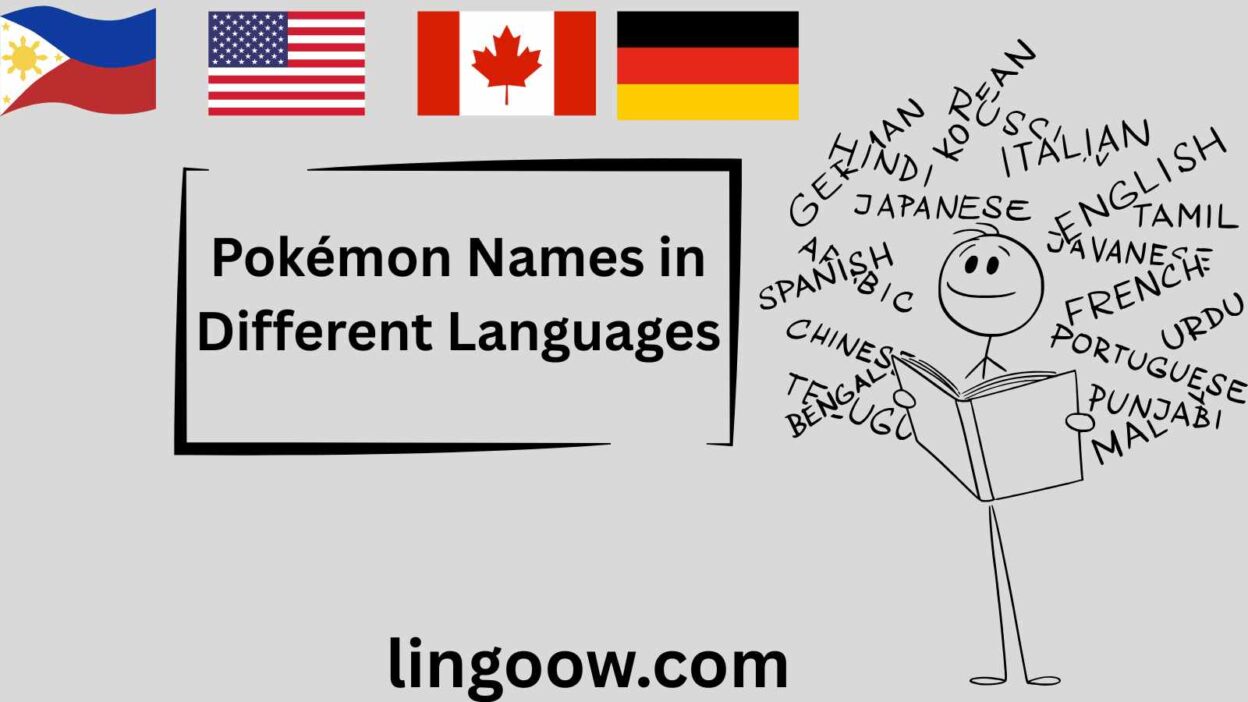As a child, I vividly remember the thrill of opening my first pack of Pokémon cards, each one a portal to a world of adventure and camaraderie. The name Pikachu rolled off my tongue with ease, a spark of joy that felt universal, even as I traded cards with friends who spoke different languages. It wasn’t just a name—it was a shared experience, a symbol of creativity and connection that transcended borders. Pokémon, a global phenomenon born in Japan, has woven itself into the fabric of countless cultures, with its iconic characters like Pikachu, Charizard, and Bulbasaur taking on unique flavors in languages worldwide. But how does Pokémon—a name derived from the Japanese Pocket Monsters (ポケットモンスター, Poketto Monsutā)—resonate across diverse linguistic landscapes? This blog post explores the fascinating variations of Pokémon names across cultures, revealing how a single concept can unite us through its universal appeal while reflecting the rich diversity of human language.
Reference Table: Pokémon Names Across Languages
Below is a table showcasing how Pokémon (and a few iconic Pokémon names) is expressed in various languages, along with cultural or linguistic insights.
| Language | Word for Pokémon | Example Pokémon Names | Cultural/Linguistic Insight |
| English | Pokémon | Pikachu, Charizard | The English name is a direct transliteration of the Japanese Poketto Monsutā, simplified for global appeal. |
| Japanese | ポケットモンスター (Poketto Monsutā) | ピカチュウ (Pikachū), ヒトカゲ (Hitokage – Charmander) | The original name reflects Japan’s love for compact, catchy phrases; Pikachu mimics the sound of a spark (pika). |
| French | Pokémon | Pikachu, Dracaufeu (Charizard) | French retains Pokémon but adapts some names, like Dracaufeu (dragon + fire), to evoke cultural imagery. |
| Spanish | Pokémon | Pikachu, Charizard | Spanish keeps the core name intact, reflecting the global brand’s consistency, with minimal changes to character names. |
| German | Pokémon | Pikachu, Glurak (Charizard) | Glurak combines glühen (to glow) and drache (dragon), emphasizing German’s descriptive naming style. |
| Mandarin Chinese | 宝可梦 (Bǎokěmèng) | 皮卡丘 (Píkǎqiū), 小火龙 (Xiǎohuǒlóng – Charmander) | The Chinese name translates to “precious dream,” evoking a sense of wonder and fantasy. |
| Hindi | पोकेमोन (Pokémon) | पिकाचू (Pikachu) | Hindi adopts the English pronunciation, reflecting India’s embrace of global pop culture. |
| Korean | 포켓몬 (Poketmon) | 피카츄 (Pikachyu), 파이리 (Pairi – Charmander) | Korean names closely mirror Japanese, with slight phonetic tweaks for local pronunciation. |
| Arabic | بوكيمون (Būkīmūn) | بيكاتشو (Bīkātshū) | Arabic transliterates the name, maintaining its global recognizability in Middle Eastern markets. |
| Swahili | Pokémon | Pikachu | Swahili adopts the English term, reflecting its integration into globalized African youth culture. |
| Zulu | Pokémon | Pikachu | Similar to Swahili, Zulu uses the global name, showing Pokémon’s reach in urban African communities. |
| Yoruba | Pokémon | Pikachu | The universal name is used, with Pikachu’s popularity resonating in Nigeria’s vibrant pop culture. |
| Maori | Pokémon | Pikachu | Māori culture embraces the global term, often tying it to themes of mythical creatures in storytelling. |
| Hawaiian | Pokémon | Pikachu | Hawaiian adopts the English name, aligning with its integration into global tourism and media. |
| Cherokee | Pokémon | ᏈᎧᏧ (Pikachu – transliterated) | Cherokee transliterates names, reflecting efforts to blend modern pop culture with indigenous identity. |
European Languages: A Tapestry of Tradition and Adaptation
In Europe, Pokémon’s universal appeal is shaped by each language’s unique phonetic and cultural lens. In French, the term Pokémon remains unchanged, but names like Dracaufeu (Charizard) blend dragon and feu (fire), evoking the grandeur of French folklore’s mythical beasts. This reflects France’s love for poetic, imagery-rich language. Spanish sticks closely to the English names, with Pokémon and Pikachu unchanged, a nod to Spain’s embrace of global pop culture while maintaining linguistic simplicity. In German, names like Glurak (Charizard) showcase a tendency to create descriptive compounds, merging glühen (to glow) and drache (dragon) to capture the creature’s fiery essence. Italian keeps Pokémon intact but tweaks names like Charizard to Charizard, preserving the original while adding a soft Italian flair. These variations highlight Europe’s balance of global influence and local linguistic pride, with Pokémon serving as a bridge between modern entertainment and centuries-old storytelling traditions.
Asian Languages: A Mosaic of Meaning
Asia, the birthplace of Pokémon, offers a rich tapestry of linguistic adaptations. In Japanese, the original Poketto Monsutā reflects a culture that values concise, evocative names. Pikachu (ピカチュウ) mimics the sound of a spark (pika) and a mouse’s squeak (chu), showcasing Japan’s onomatopoeic creativity. Mandarin Chinese transforms Pokémon into Bǎokěmèng (宝可梦), meaning “precious dream,” a poetic nod to the fantastical allure of the franchise in China’s 1.4 billion-strong market. In Hindi, spoken across India’s 1.3 billion people, Pokémon is transliterated as पोकेमोन, maintaining its global identity while resonating with India’s vibrant youth culture. Korean’s Poketmon (포켓몬) and Pikachyu (피카츄) stay close to the Japanese roots, reflecting cultural proximity. In Arabic, spoken across 20+ countries like Saudi Arabia and Egypt, Būkīmūn (بوكيمون) preserves the name’s essence, adapting it to Arabic script while maintaining its appeal in Middle Eastern gaming communities. These variations underscore Asia’s diverse linguistic landscape, where Pokémon becomes a shared dream woven into local identities.
African Languages: A Continent of Connection
In Africa, Pokémon’s global reach meets rich linguistic diversity. Swahili, spoken in countries like Kenya and Tanzania, adopts Pokémon directly, reflecting its role as a lingua franca embracing global trends. Zulu, prevalent in South Africa, also uses Pokémon, with names like Pikachu resonating in urban youth culture. Yoruba, spoken in Nigeria, keeps the global term, tying it to the country’s booming pop culture scene. Across Africa’s 54 countries, including nations like Ghana, Ethiopia, and Algeria, the English term Pokémon dominates due to widespread media influence, but local languages add unique flavors. For example, in Amharic (Ethiopia), Pokémon is transliterated as ፖኬሞን, maintaining its global identity. The franchise’s themes of adventure and friendship echo African oral traditions, where stories of mythical creatures unite communities, making Pokémon a modern extension of this legacy.
Indigenous & Island Languages: Voices of Heritage
Indigenous and island languages bring a unique perspective to Pokémon’s global narrative. In Māori (New Zealand), Pokémon is adopted as-is, with characters like Pikachu resonating with Māori storytelling’s focus on mythical beings. Hawaiian, spoken in Hawaii, embraces Pokémon, aligning its fantastical creatures with Polynesian legends of guardian spirits. Cherokee (United States) transliterates names like Pikachu (ᏈᎧᏧ), blending modern pop culture with efforts to preserve indigenous language. Samoan, spoken in Samoa, uses Pokémon, tying it to narratives of heroism and nature. Across 20+ countries with indigenous or island languages, including Fiji, Tonga, and Native American communities, Pokémon’s universal themes of courage and connection resonate deeply, often paralleling traditional tales of mythical creatures and quests.
Cultural Insights: A Global Legacy
The word Pokémon, rooted in Japan’s Poketto Monsutā, has evolved from a niche video game title in 1996 to a global cultural juggernaut. Its name, a blend of “pocket” and “monster,” reflects Japan’s knack for compact, marketable concepts. Over time, Pokémon’s universal appeal—friendship, adventure, and discovery—has been adapted to fit cultural contexts. In China, Bǎokěmèng evokes dreams and wonder, aligning with Confucian values of growth. In Arabic-speaking regions, Būkīmūn fits into a growing gaming culture, with Pikachu becoming a symbol of youthful creativity. Historically, Pokémon’s rise mirrors the spread of anime and manga, bridging East and West through shared storytelling. Its global success lies in its ability to feel both universal and deeply personal, rooted in each culture’s unique lens.
Proverbs and Sayings: Wisdom Through Pokémon
Pokémon’s cultural impact has inspired modern sayings and reflections, though traditional proverbs are rare. Here are some cultural expressions tied to Pokémon’s themes:
- Japanese: “小さなモンスター、大きな夢” (Chiisana monsutā, ōkina yume) – “Small monsters, big dreams,” reflecting Japan’s emphasis on humble beginnings leading to great achievements.
- Chinese: “宝可梦,点燃心中之梦” (Bǎokěmèng, diǎnrán xīnzhōng zhī mèng) – “Pokémon, igniting the dream in your heart,” tying to China’s focus on aspiration.
- English: “Gotta catch ’em all!” – A global slogan embodying ambition and unity, now a cultural touchstone.
These sayings highlight Pokémon’s role as a metaphor for perseverance and connection across cultures.
FAQs: Unraveling Pokémon’s Linguistic Journey
Why does Pokémon sound similar in many languages?
The name is a deliberate transliteration of Poketto Monsutā, designed by Nintendo for global consistency. Its short, catchy structure makes it easy to adapt across phonetic systems.
What’s the oldest known usage of Pokémon?
The term debuted in 1996 with the release of Pokémon Red and Green in Japan, derived from Pocket Monsters.
How do cultural differences shape Pokémon names?
While the core term remains consistent, character names like Charizard (Dracaufeu in French, Glurak in German) reflect local linguistic creativity, aligning with cultural values like mythology or descriptive naming.
Conclusion: A World United by Pokémon
Pokémon is more than a name—it’s a universal language of imagination, adventure, and connection. From Tokyo’s bustling streets to the vibrant markets of Lagos, from Māori storytellers to Cherokee language revitalization, Pokémon’s names carry a shared spark that lights up hearts across the globe. Its ability to adapt while remaining recognizable speaks to its emotional power, uniting us in a shared journey of discovery. What’s your favorite Pokémon name in your language? How does it resonate with your culture? Share your stories in the comments below, and let’s celebrate the global tapestry of Pokémon together!

I’m Aurora Hale, a passionate and professional author dedicated to exploring the beauty and power of language. Through my work, I aim to inspire readers, spark curiosity, and make learning both engaging and meaningful. As the founder of Lingoow.com, I’ve created a platform where language enthusiasts can discover innovative ways to communicate, learn, and connect with the world. Every story I write and every lesson I share reflects my commitment to creativity, clarity, and the transformative magic of words. Join me on this journey at Lingoow.com to unlock your linguistic potential and embrace the joy of language.




